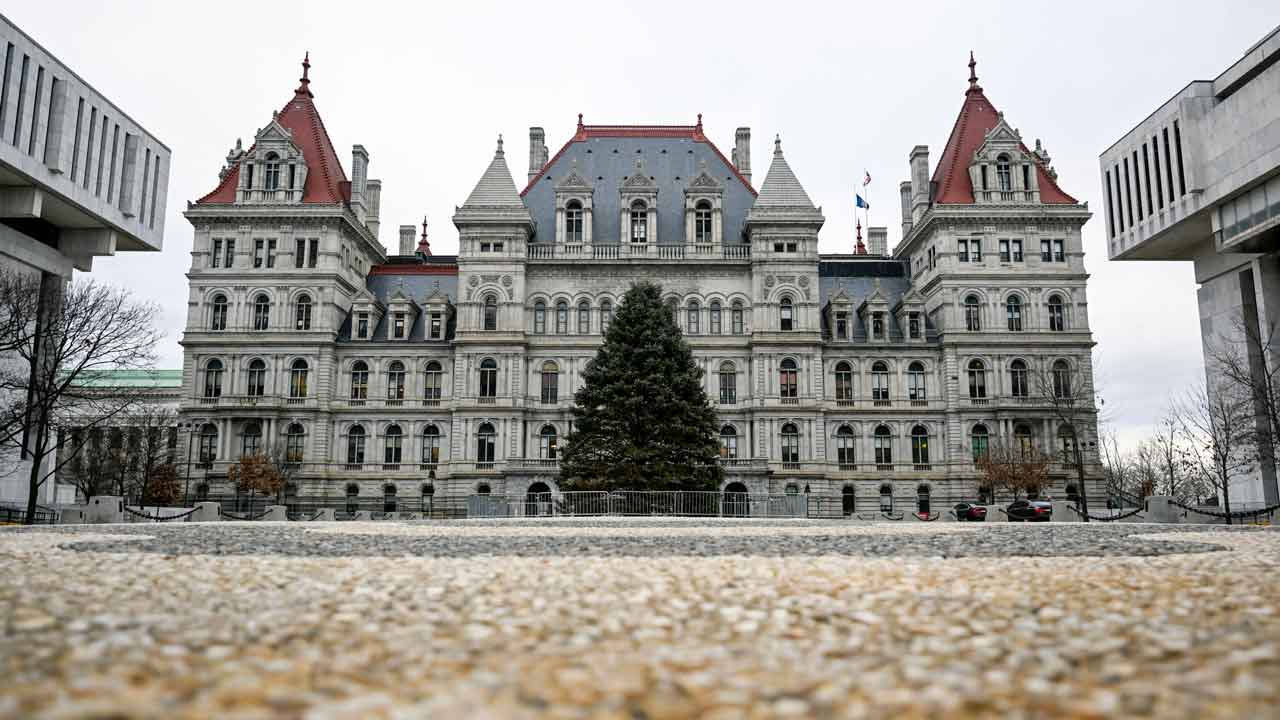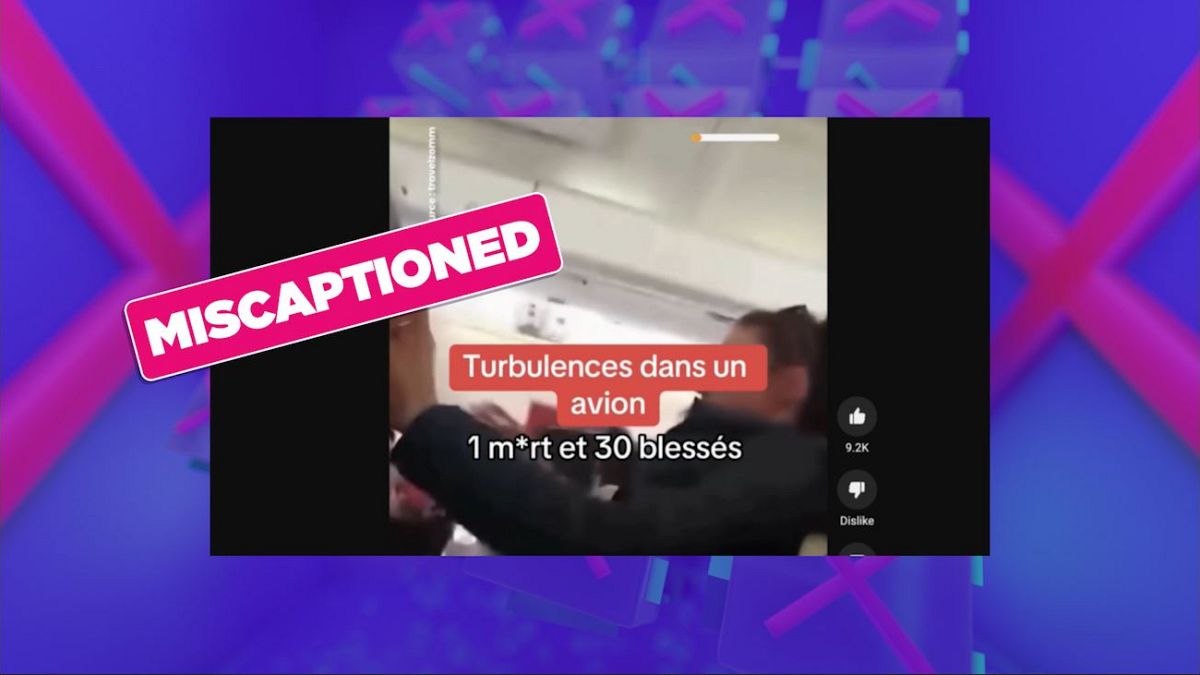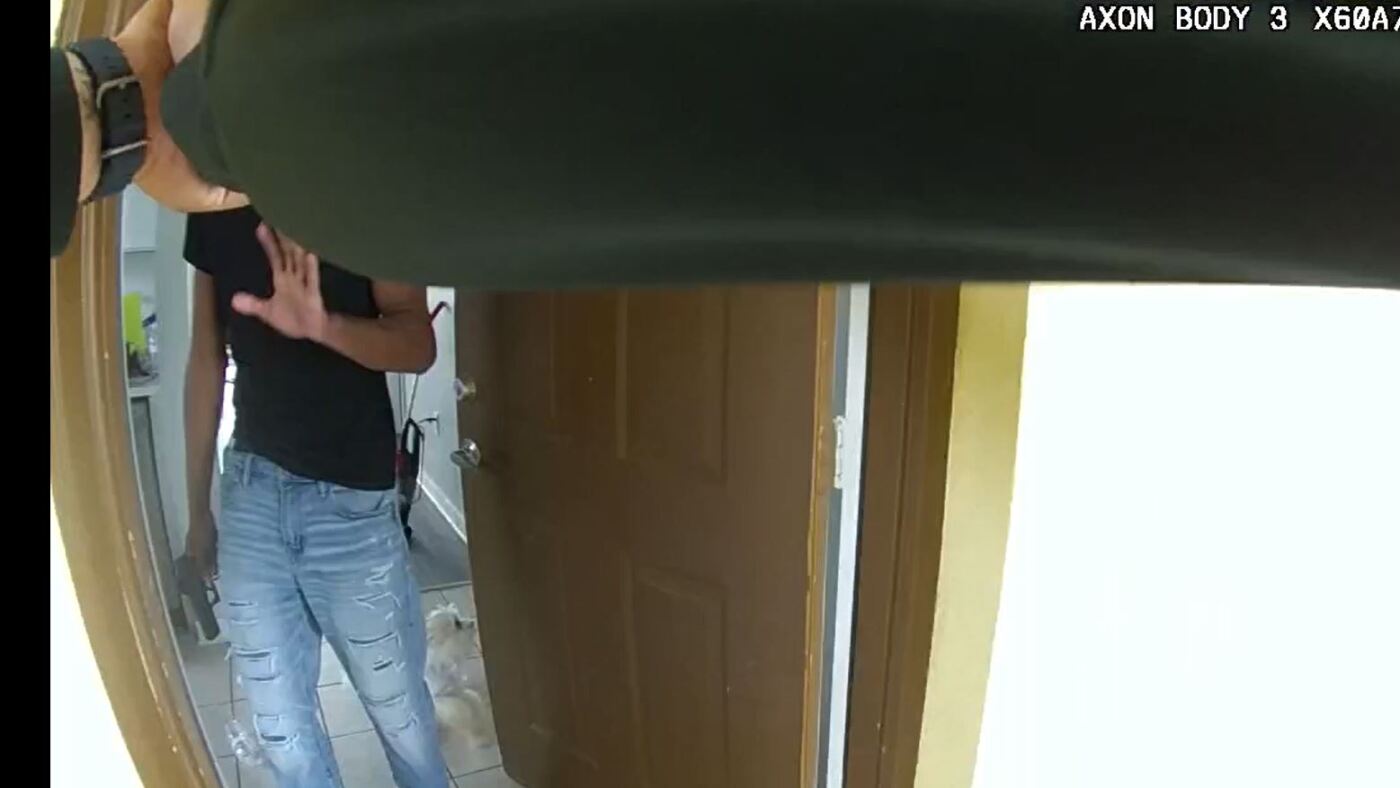Arizona
Latest winter storm brings rain, snow to Arizona; major highways closed
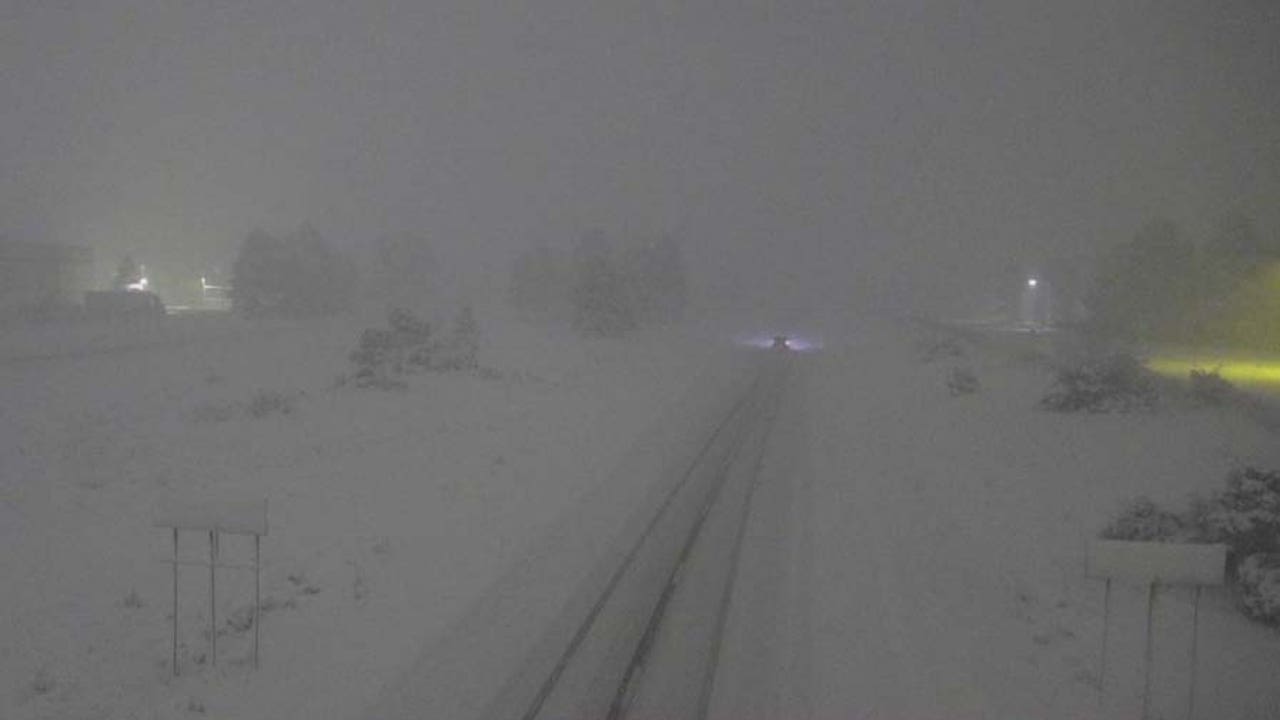
The latest winter storm has dumped rain and snow across Arizona, and the weather shut down major highways in the state.
In the Valley, rain began to fall overnight and into Wednesday morning. Lingering showers are expected throughout the day.
Up north in Flagstaff, heavy snow continues to fall on Wednesday, closing major highways and shutting down schools.
Heavy snow falls along Interstate 40 in Flagstaff on Feb. 7. (ADOT)
The latest highway closures, according to the Arizona Department of Transportation:
- I-40 eastbound at US 93
- I-40 eastbound at Ash Fork
- I-40 westbound at Williams
- I-40 westbound at Winslow
- I-40 westbound at Holbrook
- State Route 87 southbound at Winslow
- State Route 64 east of the Grand Canyon National Park
- State Route 260 eastbound near Camp Verde
- State Route 89A northbound
School closures
The Flagstaff Unified School District says all schools will be closed on Feb. 7.
Latest forecast
Morning Weather Forecast – 2/7/24
Lingering rain showers are likely to continue today in the Valley, and more snowfall in the high country.
Road Conditions
- Call 511 anywhere in Arizona or 1-888-411-ROAD (7623)
- az511.com
Satellite and radar

Latest rain totals
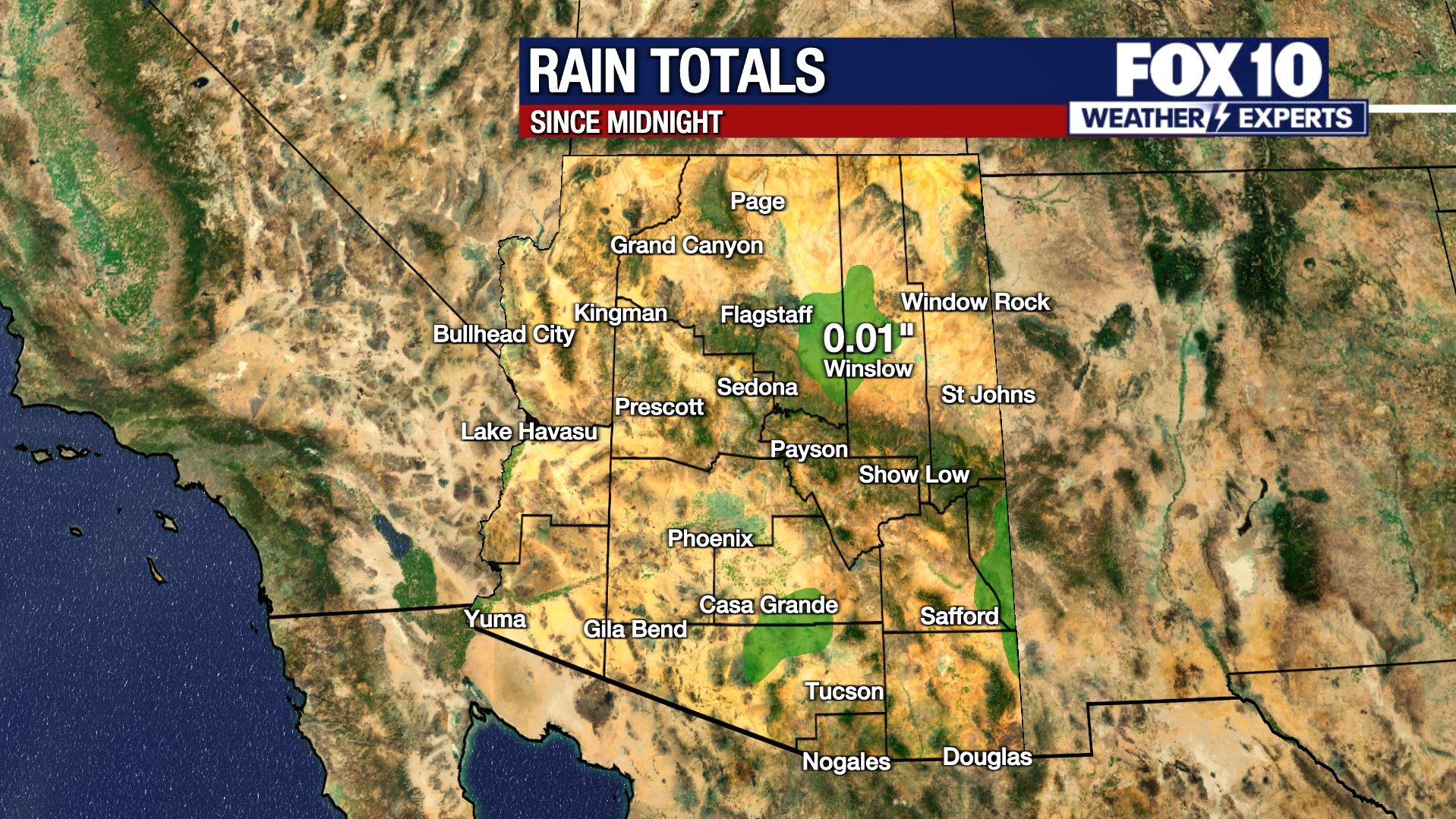
Leave prepared before heading north
After recent snowfall in the high country, the Arizona Department of Transportation is reminding drivers who are heading north to never park along highways to play in the snow.
Use the highway shoulders for emergencies only. Parking on them to play in the snow is hazardous in the following ways:
- Other drivers may be distracted by your vehicle.
- Other drivers may pull over as well to play in the snow, compounding the problem.
- Your vehicle may interfere with first responders who need to use the shoulder.
- Plows can throw snow and ice far off highways.
- It’s much safer to re-enter highways from on-ramps and other designated entrances
“Also, it’s not uncommon for lots of desert dwellers to take the opportunity to head north to play in the snow. So, remember to pack your patience and expect to spend extended time in your vehicle getting to and from snow play areas.”
ADOT’s suggestions for items to take along:
- Warm clothing and blankets
- A fully charged mobile phone and charger
- Flashlight with extra batteries
- Drinking water
- Healthy snacks
- First-aid kit and necessary medications
- Ice scraper
- Small bag of sand or kitty litter for wheel traction
- Small folding shovel for snow removal
- Travel tool kit and battery cables
- Safety flares
- Plastic bags or containers for sanitation
- Road map(s)
ADOT says you and your vehicle must be prepared for driving in wintry conditions, including snow, ice and freezing temperatures.
- Get plenty of rest
- Plan your route in advance and notify someone about your route, destination and arrival time
- Take frequent breaks from driving
- Make sure your fuel tank is at least half to three-quarters full at all times
- Use snow tires, chains or studded tires as recommended or required. Studded tires are permitted on Arizona highways from Oct. 1 to May 1.
- Ensure your wipers, window defroster, headlights, taillights, brake lights and turn signals work
- Change your motor oil to a winter grade
- For electric or hybrid vehicles, be sure the battery has sufficient voltage and the connection cables are tight
Get more safety tips at https://azdot.gov/KnowSnow
For Flagstaff area snow-play locations, see FlagstaffArizona.org’s Winter Recreation Map or call 844-256-SNOW.
Rain/flood safety tips
The American Red Cross’ tips for heavy rain situations and flood safety:
- Turn around don’t drown! If you must drive and you encounter a flooded roadway, turn around and go another way.
- If you are caught on a flooded road and waters are rising rapidly around you, get out of the car quickly and move to higher ground.
- Tune in to your local radio, NOAA radio, or news channels for the latest updates.
- If your neighborhood is prone to flooding, be prepared to evacuate quickly.
- Follow evacuation orders and do not attempt to return until officials say it is safe.
- If power lines are down, do not step in puddles or standing water.
- If power is out, use a flashlight. Do not use any open flame as alternate lighting.
Preparing for a severe thunderstorm
The American Red Cross’ tips for preparing for a severe thunderstorm:
- Put together an emergency kit.
- Know your community’s evacuation plan.
- Create a household disaster plan and practice it.
- Purchase a battery-powered or hand-crank radio
- Discuss thunderstorm safety with members of your household. Be aware that a thunderstorm could produce flooding.
- Pick a safe place in your home for household members to gather during a thunderstorm. This should be a place where there are no windows, skylights, or glass doors, which could be broken by strong winds or hail and cause damage or injury.

Arizona
Where abused children in Southern Arizona begin path to healing

TUCSON, Ariz. (13 News) – It’s a grim reality, but children across southern Arizona are abused or neglected every day.
Just this month, 13 News reported on two separate cases in Tucson where children with disabilities died, allegedly at the hands of their caregivers.
One local organization’s mission is to get these children out of harm’s way before it’s too late.
When law enforcement or the Department of Child Safety believe a child may be experiencing abuse, they are brought to the Children’s Advocacy Center in Tucson. Here, a child can share their story, get medically evaluated, and begin a path to healing.
Child abuse coverage
Pima County couple accused in death of special needs child
Police: Special needs boy dies from neglect in Tucson
“Every day we meet about six new children who need our help,” said Executive Director Marie Fordney.
Of the thousands of child abuse cases investigated in Pima County every year, the Children’s Advocacy Center deals with the most severe.
“People ask me how I can do this work because we are seeing the worst of the worst. It is truly awful the things that we see and hear,” Fordney said. “I leave this building full of hope every day because every child that came here is better off now.”
Fordney said they work with children who have suffered either sexual or physical abuse and neglect. They also serve those who might be a potential victim of human trafficking, child porn, and more.
“Children are brought here if they are witnesses to a violent crime,” Fordney said. “We help children who have witnessed homicide or domestic violence just as much as we help children who have themselves been the victim.”
Fordney also says 35% of the children they serve have a disability.
“Children with disabilities may be less able to speak up or make a report when something is happening to them,” she said.
The center works with authorities at the onset of an investigation and helps collect evidence through a recorded forensic interview and medical exam.
“We collect the evidence in a way that supports the healing for the child, and keeps it from being such a difficult situation for them,” Fordney said. “Before we had a Children’s Advocacy Center, a child might have been interviewed up to seven times and they would have had to get their medical services in an emergency room.”
Fordney showed 13 News the exam room they have on site.
“Not only is this space more comforting, but also the team providing the exams is really well trained and knows what they’re doing,” Fordney said showcasing the exam room.
Fordney said investigators will leave the center to make an arrest, but most of the time support can be put in place for the family.
“More frequently the kids are able to go back home because they have a supportive home environment, and it was a stranger, or it was somebody who lives in the home that has been kicked out of the home who was abusing them,” she said.
She said a lot of these cases are reported to them by neighbors and community members who saw something that concerned them.
“Our children really rely on all of us to be watching for signs that they are in trouble and to make that call.”
To make a report, call 911 or call the Arizona Child Abuse Hotline at 1-888-SOS-CHILD.
For more information on resources provided at the Children’s Advocacy Center, visit their website.
Be sure to subscribe to the 13 News YouTube channel: www.youtube.com/@13newskold
Copyright 2024 13 News. All rights reserved.
Arizona
California lawmakers just stuck it to Arizona anti-abortion fanatics
Opinion: California lawmakers passed a law, signed by the governor, that allows Arizona doctors to perform abortions in California through Nov. 30.
Arizona Democrats celebrate approval of 1864 abortion ban repeal
State Rep. Stephanie Stahl Hamilton and state Sen. Anna Hernandez talk about the Senate passage of the repeal of the 1864 abortion ban on May 1, 2024.
It shouldn’t be necessary, but it’s good news.
California lawmakers are trying to protect the reproductive health of Arizona women in a way that the Republicans who control the Arizona Legislature are not.
California’s legislature passed a law, signed by Gov. Gavin Newsom, that allows licensed Arizona doctors to go to California to perform abortions. The law will expire on Nov. 30.
What that means, essentially, is that if the draconian 1864 abortion ban that was on the books in Arizona kicks in before the law repealing it takes effect, Arizona doctors and their patients would have an alternative.
California law is a ‘critical stopgap’ for Arizona
When the California option was first being discussed, Arizona Attorney General Kris Mayes posted support for the plan on social media, saying, “My office will continue to do everything we can to support our medical professionals as they work to provide care for their patients.”
It’s not ideal. But it’s something.
Abortion ban judge: Makes a paltry appeal to keep his job
Newsom said, “I’m grateful for the California Legislative Women’s Caucus and all our partners for moving quickly to provide this backstop. California stands ready to protect reproductive freedom.”
The California governor’s office called the new law “a critical stopgap for Arizona patients and providers.”
At least concern for women crosses state lines
It’s a stopgap Arizona patients should not have needed.
It’s a stopgap that Arizona lawmakers should have provided.
But it’s a stopgap that Arizona’s most virulent anti-abortion lawmakers and their supporters did not want.
Luckily, concern for women’s health is a doctrine that crosses state lines.
Reach Montini at ed.montini@arizonarepublic.com.
For more opinions content, please subscribe.
Arizona
Arizona Senate Republicans advance controversial border ballot measure

Bridget Dowd/KJZZ
The Arizona Senate building in Phoenix.
A border security ballot measure advanced through the Arizona Senate on Wednesday on party lines with amendments that Republicans say will ensure no one is racially profiled under the proposal.
The legislation, HCR 2060, would make it a state crime to enter Arizona from Mexico outside of a designated port of entry. That’s already illegal under federal law, but can’t be locally enforced.
The measure is based on a Texas law, SB 4, that is currently blocked from going into effect, as it’s being challenged in court.
Democrats have likened the measure to SB 1070, a controversial immigration law passed in 2010 that was commonly known as the “show me your papers” bill. That law sparked months of protests, and portions of it were later struck down in court.
HCR 2060 is similar to a bill Republicans passed earlier this year, only for it to be vetoed by Democratic Gov. Katie Hobbs. Republicans now aim to bypass the governor’s veto stamp by referring the measure to Arizona voters this November.
But the Senate’s approval is not the last step – the new measure goes next to a vote in the House of Representatives, which isn’t scheduled to convene again until the beginning of June.
And even if approved by the Senate, House and voters, the measure also cannot take effect unless Texas’ SB 4 is cleared in court.
The Senate only approved the measure after adopting several amendments insisted on by Sen. Ken Bennett (R-Prescott). Every Democrat in the Senate opposed the bill, and Republicans only hold a one-seat majority in the Senate – meaning Bennett held the crucial 16th vote needed to move the measure forward.
Bennett objected to part of the bill that would have allowed law enforcement officers to deport recipients under the Deferred Action for Childhood Arrivals program, in the event a future administration or court order canceled the program.
While voting, Bennett said he was satisfied with an amendment that states the proposal will go into effect prospectively, and will not affect anyone who has been in the country illegally or otherwise if and when the law goes into effect.
Bennett also praised language GOP supporters say will prevent racial profiling under the proposal.
“I’ve done everything I can at this point to make sure that doesn’t happen,” Bennett said before the vote.
But Democrats said their concerns that the measure will be weaponized and used for racial profiling were not satisfied by the amendment. Sen. Rosanna Gabaldón (D-Tucson) spoke about her experience under SB 1070, warning the same could happen under this new proposal.
“Each time that I was stopped, I asked why. Majority of the time, they said, ‘no, prove your citizenship,’ or something like that,” she said. “They didn’t tell me how I broke the law. To me, I believe they didn’t have probable cause, stopping me because of what I looked like.”
Tensions ran high, as debate on the measure lasted more than four hours.
The amended measure states that law enforcement can only arrest someone if they witness them crossing the border illegally, if there is a technological recording of the crossing or if there is “any other constitutionally sufficient [signs] of probable cause.”
It’s the third, more vague explanation of probable cause that Democrats said could be abused. Sen. John Kavanagh (R-Fountain Hills) argued in favor of that third definition, insisting there are other ways to get probable cause that someone has crossed the border illegally, such as a confession.
“Criminals are stupid,” Kavanagh said, eliciting gasps from onlookers in the Senate gallery opposed to the proposal.
“I’m sorry if I offended any criminals in the gallery,” he added.
That comment led to a heated exchange between Kavanagh and Sen. Catherine Miranda (D-Phoenix), who accused him of racial profiling, which he denied and requested an apology for.
Miranda later warned that, like in Texas, this measure will be challenged if it passes and will ensnare the state in an expensive legal process. She cited warnings from the Senate’s own lawyers that the measure may be unconstitutional and could also violate Arizona statute that requires ballot referrals to cover a single subject.
Miranda argued a different part of the ballot referral that includes enhanced sentencing guidelines for a person found guilty of knowingly selling fentanyl that causes the death of another person violates that restriction.
Sen. Christine Marsh (D-Phoenix) also objected to the fact that the measure refers to fentanyl. Marsh argued that it won’t stop that drug from hurting Arizonans, citing Border Patrol figures that show most fentanyl trafficked into the country is being moved by legal residents through official ports of entry.
“This bill will not solve the fight against this crisis,” Marsh said. “It makes it appear falsely that there’s already a solution to the crisis.”
The bill was also amended to say that someone who chooses to “self-deport” could go back across the border into Mexico, or to their “country of origin” if it is not Mexico.
Senate Minority Leader Mitzi Epstein (D-Tempe) questioned how that will be enforced. She and other Democrats also questioned how much the measure will cost the state since it doesn’t include any appropriation of funds.
Republicans did not have specific answers to that criticism. Sen. David Gowan (R-Sierra Vista), the bill’s sponsor, only said that those charged under the law would be financially responsible for self-deporting.
Roughly halfway through the proceedings, Sen. T.J. Shope (R-Coolidge) was interrupted by protesters with LUCHA, an advocacy group opposed to the measure, who yelled “Stop the hate,” and cursed at Republicans before being escorted out by security.
Sen. Anna Hernandez (D-Phoenix) said that not only is she concerned about racial profiling, but how individuals who believe they are victims of that treatment will hold law enforcement accountable.
She drew attention to a section of the bill that grants law enforcement officers civil immunity if they are sued for enforcing the law.
“What legal recourse will they have?” Hernandez asked the room.
Senate President Warren Petersen (R-Gilbert) rejected that criticism, saying the immunity clause applies to issues at the state level, not alleged violations of federal Civil Rights laws.
→ Get more Arizona politics news

-

 Politics1 week ago
Politics1 week agoDem newcomer aims for history with primary win over wealthy controversial congressman
-

 Politics1 week ago
Politics1 week agoSouthern border migrant encounters decrease slightly but gotaways still surge under Biden
-

 World1 week ago
World1 week agoSlovakia PM Robert Fico in ‘very serious’ condition after being shot
-

 World1 week ago
World1 week agoCanadian Nobel-winning author Alice Munro dies aged 92
-

 Politics1 week ago
Politics1 week agoVulnerable Dem incumbents move to the center in key swing states as Biden panders to far-left base
-

 News1 week ago
News1 week agoDespite state bans, abortions nationwide are up, driven by telehealth
-

 World1 week ago
World1 week ago‘Monstrous crime’: World reacts to attack on Slovakia’s prime minister
-

 News1 week ago
News1 week agoSmall but mighty Nimble becomes first mixed-breed dog to win Westminster agility title
















